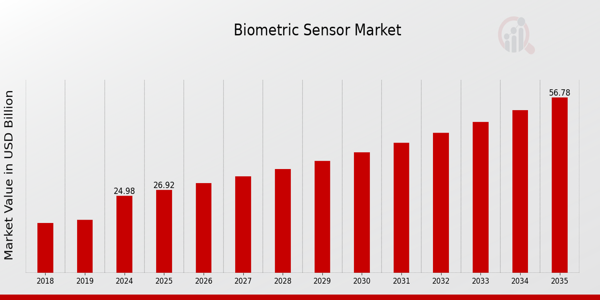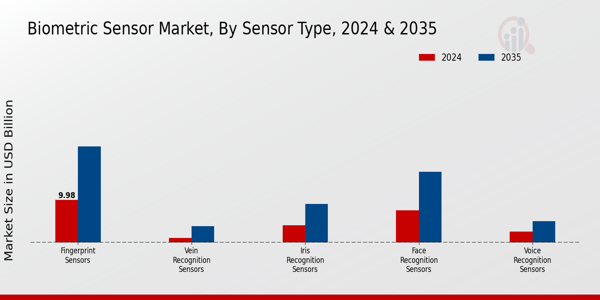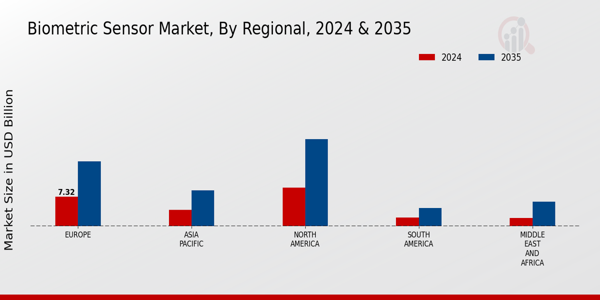Global Biometric Sensor Market Overview
As per MRFR analysis, the Biometric Sensor Market Size was estimated at 23.18 (USD Billion) in 2023. The Biometric Sensor Market Industry is expected to grow from 24.98 (USD Billion) in 2024 to 56.78 (USD Billion) by 2035. The Biometric Sensor Market CAGR (growth rate) is expected to be around 7.75% during the forecast period (2025 - 2035).
Key Biometric Sensor Market Trends Highlighted
The Biometric Sensor Market is seeing some interesting developments since more and more businesses need security solutions. The growth in identity theft and cybersecurity breaches has led governments and businesses to use biometric technologies to make things safer. Key market factors, such as how biometric sensors have become more affordable due to improvements in technology and production, have made them widely used. Also, more people are using biometrics for mobile and digital payments, which is changing how people act and pushing businesses to include these technologies in their main activities.
Biometric sensors might be used in healthcare to help identify patients and make sure that medical data is safe. These are just a few of the possibilities that could be investigated further. As governments throughout the globe work on smart city projects, adding biometric technologies to municipal infrastructure opens up even more ways for development. It is becoming more common to use multi-modal biometric systems that incorporate other types of identification, such as fingerprint scanning and face recognition. This makes them more accurate and reliable.
Privacy laws are becoming more important, and this is pushing the development of biometric technologies to make sure they meet requirements that keep user data safe.
The increased interest in using data ethically is changing how biometric solutions are sold and used. In the global setting, better connectivity, and the rise of the Internet of Things (IoT) are making it easier to create new biometric solutions. This means that the market will continue to expand in many different areas and for many different uses.

Source: Primary Research, Secondary Research, MRFR Database and Analyst Review
Biometric Sensor Market Drivers
Increase in Security Concerns
The rise in security concerns globally is a significant driver for the Biometric Sensor Market Industry. With increasing instances of cybercrime, identity theft, and unauthorized access to sensitive information, organizations are compelled to adopt stronger security measures. A report from the International Telecommunications Union reveals that the global cost of cybercrime reached approximately 600 USD Billion in 2018, indicating the seriousness of the issue.Governments and established organizations, such as the FBI and the European Union Agency for Cybersecurity, have advocated for the implementation of biometric technologies in enhancing security protocols.
The appeal for biometric authentication systems, which utilize unique human characteristics for verification, is growing, as these systems provide a higher level of security compared to traditional password-based systems. According to industry standards and trends, the shift towards biometric authentication can lead to increased adoption rates within corporate and governmental sectors globally.
Advancements in Biometric Technology
Technological advancements play a pivotal role in driving the Biometric Sensor Market Industry. Research and Development in areas such as fingerprint scanning, facial recognition, and iris recognition have significantly enhanced the accuracy and efficiency of biometric sensors. According to recent studies published by the National Institute of Standards and Technology, the accuracy of fingerprint recognition has improved over the past few years, showcasing a decrease in false acceptance rates by around 30%.This has not only increased the reliability of these systems but also expanded their usage across various sectors including finance, healthcare, and government.
Prominent organizations, including Honeywell and NEC Corporation, are actively investing in innovative biometric solutions, further propelling market growth in the global landscape.
Growing Adoption in Consumer Electronics
The increasing integration of biometric sensors in consumer electronics is a significant driver for the Biometric Sensor Market Industry. Devices such as smartphones, laptops, and wearables are increasingly equipped with biometric features, such as fingerprint sensors and facial recognition technologies. According to data from the International Data Corporation, approximately 80% of smartphones shipped globally in 2021 featured biometric authentication capabilities.This trend is expected to rise as manufacturers, including Apple and Samsung, prioritize enhanced security features to appeal to consumers.
With the rising awareness regarding privacy and the protection of personal data, the demand for biometric sensors in consumer devices is projected to boost market growth significantly.
Biometric Sensor Market Segment Insights
Biometric Sensor Market Sensor Type Insights
The Biometric Sensor Market has shown significant growth, driven by the increasing implementation of biometric technologies across various sectors including security, healthcare, and finance. Within the sensor type segment, the market is poised for remarkable expansion with overall valuation reaching 24.98 USD Billion in 2024 and continuing to grow.
Notably, fingerprint sensors hold a dominant position, valued at 9.98 USD Billion in 2024, due to their widespread adoption in mobile devices and access control systems, making them a preferred biometric solution.Following closely, face recognition sensors are gaining traction, anticipated to reach a market value of 7.49 USD Billion in 2024, significantly leveraged by advancements in artificial intelligence and machine learning that enhance their accuracy and reliability. Iris recognition sensors, valued at 3.99 USD Billion in 2024, offer an added layer of security through unique iris patterns, finding applications in high-security scenarios.
Voice recognition sensors, valued at 2.5 USD Billion, are valued for their user-friendly approach in personal assistants and customer service interfaces.Additionally, vein recognition sensors, holding a market value of 1.02 USD Billion in 2024, are emerging as a secure identity verification method, primarily in banking and healthcare sectors due to their low false acceptance rates. The market is expected to witness a steady increase through to 2035, fueled by continuous technological advancements, the rising demand for secure authentication, and the growing trend of the Internet of Things.
The Biometric Sensor Market revenue illustrates a promising trajectory, with multiple opportunities arising from integrating these sensors into smart devices and systems, further expanding their reach and usability in the global market.

Source: Primary Research, Secondary Research, MRFR Database and Analyst Review
Biometric Sensor Market Technology Insights
The Biometric Sensor Market has demonstrated significant growth due to its expanding technology segment, which encompasses various types of sensors used for biometric identification. As of 2024, the market is valued at 24.98 USD Billion, reflecting a robust demand for advanced security solutions globally. The different sensor technologies, including Capacitive Sensors, Optical Sensors, Ultrasound Sensors, Infrared Sensors, and RFID Sensors, each play a crucial role in enhancing security and user verification processes.
Capacitive Sensors are prominent for their ability to detect touch, making them essential in smartphones.Optical Sensors dominate facial recognition applications, while Ultrasound Sensors are used for more secure fingerprint scanning. Infrared Sensors enhance the capability of vision-based biometric systems in diverse lighting conditions, and RFID Sensors facilitate seamless identity verification in various environments. The versatile applications of these sensors cater to the needs of sectors such as healthcare, banking, and retail, where secure access is paramount.
The market growth is driven by the increasing demand for enhanced security and privacy measures on a global scale, alongside the ongoing developments aimed at overcoming technical challenges related to sensor accuracy and reliability.
Biometric Sensor Market Application Insights
The Biometric Sensor Market, with a valuation of 24.98 USD Billion in 2024, highlights a strong focus on various application segments such as Access Control, Time and Attendance, Identity Verification, Smartphones and Tablets, and Banking and Payment. Access Control is becoming essential for securing facilities, while Time and Attendance systems enhance accuracy in employee monitoring. Moreover, Identity Verification is vital for boosting security in online transactions, reflecting a growing need for robust measures in that area.
The proliferation of Smartphones and Tablets has also propelled the demand for biometric technologies, allowing users to authenticate themselves conveniently.Additionally, the Banking and Payment sector has increasingly adopted biometric solutions, enhancing transaction security and customer experience. This diverse application landscape demonstrates the Biometric Sensor Market's revenue growth potential, driven by advancements in technology and heightened awareness of security needs among individuals and organizations worldwide. Key trends such as the integration of biometrics in emerging technologies signal significant growth opportunities for stakeholders within this market space.
With its anticipated expansion, the Biometric Sensor Market statistics reveal a dynamic landscape capable of addressing varied consumer demands across global markets.
Biometric Sensor Market End Use Insights
The Biometric Sensor Market has shown substantial growth across various end-use applications, with the overall market expected to reach 24.98 USD Billion in 2024. The sector encompasses diverse areas including Government, Healthcare, Retail, Banking and Financial Services, and Consumer Electronics, each contributing significantly to market dynamics. The Government sector employs biometric sensors for enhanced security, identity verification, and efficient border control measures, reflecting its essential role in national safety.
In Healthcare, these sensors streamline patient management and ensure better data security, which is increasingly vital in protecting sensitive information.The Retail segment utilizes biometric technology for personalized customer experiences and secure payment processing, while Banking and Financial Services benefit from enhanced security measures against fraud. Consumer Electronics is also rapidly adopting biometric sensors for convenient authentication purposes in smart devices.
With a projected compound annual growth rate (CAGR) of 7.75% for the period of 2025 to 2035, the Biometric Sensor Market is well-positioned to address growing trends such as digitalization and increased focus on security across all sectors, paving the way for innovative applications and integration in daily life.
Biometric Sensor Market Regional Insights
The Biometric Sensor Market is exhibiting considerable growth across its regional segments. In 2024, the market value is expected to reach 24.98 USD Billion, driven primarily by robust adoption and technological advancements in the field. North America dominates with a significant market value of 9.56 USD Billion in 2024, fueled by strong demand in security and access control systems, reflecting its majority holding in the market landscape.
Europe follows closely with a valuation of 7.32 USD Billion, benefiting from stringent regulations on data security.Meanwhile, Asia Pacific presents promising growth with a projection of 4.0 USD Billion in 2024, driven by increasing investments in smart technology and government initiatives. South America and the Middle East and Africa exhibit smaller market shares, valued at 2.1 USD Billion and 2.0 USD Billion, respectively, in 2024, but both regions show potential for gradual expansion as awareness of biometric solutions improves.
These regional dynamics illustrate a diverse landscape, where key players are strategically positioned to enhance their market growth through innovation and addressing local security needs.Overall, the Biometric Sensor Market data reflects a trend toward increasing reliance on biometric solutions across various applications, driving the demand for advanced sensor technologies.

Source: Primary Research, Secondary Research, MRFR Database and Analyst Review
Biometric Sensor Market Key Players and Competitive Insights
The Biometric Sensor Market is characterized by rapid technological advancements and increasing demand for secure authentication solutions across various sectors. As businesses and governments seek to enhance security measures while improving user accessibility, biometric sensors have gained prominence. This market is witnessing the emergence of several key players, each vying for market share by offering innovative products and services tailored to the demands of different applications including border control, access control, and healthcare management.
Competitive insights reveal that companies in this space are focusing on enhancing their technological capabilities, expanding their global presence, and leveraging strategic partnerships to strengthen their positions. The competitive landscape is dynamic, with companies increasingly investing in research and development to bring cutting-edge solutions to market and address evolving consumer needs.Innovatrics has made significant strides in the Biometric Sensor Market, particularly through its sophisticated biometric software solutions and identity verification technologies. The company has developed key products that encompass a wide range of biometric modalities, including fingerprint recognition, facial recognition, and iris recognition systems.
Innovatrics has cultivated a solid market presence by partnering with government agencies, enterprises, and other organizations globally to implement its biometric technologies for secure identification and authentication processes.
The company’s strengths lie in its innovative algorithms, which enhance efficiency and accuracy in identity verification, making them a preferred choice in various implementations. Furthermore, Innovatrics has engaged in strategic mergers and acquisitions to bolster its technology offerings, thereby expanding its capabilities and market footprint within the global arena. Their commitment to research and development continues to drive advancements, ensuring that Innovatrics remains at the forefront of the biometric sensor industry.
Key Companies in the Biometric Sensor Market Include
- Innovatrics
- Fingerprint Cards
- Samsung Electronics
- Idemia
- HID Global
- Apple
- Aware
- Synaptics
- NEC Corporation
- Fujitsu
- Thales Group
- Qualcomm
Biometric Sensor Market Developments
-
Q3 2024: Mastercard launches global payment passkey service with biometric authentication Mastercard announced the global launch of its payment passkey service, which features biometric authentication options including fingerprint and facial recognition, aiming to enhance convenience and security for online transactions.
Biometric Sensor Market Segmentation Insights
-
Biometric Sensor Market Sensor Type Outlook
- Fingerprint Sensors
- Face Recognition Sensors
- Iris Recognition Sensors
- Voice Recognition Sensors
- Vein Recognition Sensors
-
Biometric Sensor Market Technology Outlook
- Capacitive Sensors
- Optical Sensors
- Ultrasound Sensors
- Infrared Sensors
- RFID Sensors
-
Biometric Sensor Market Application Outlook
- Access Control
- Time and Attendance
- Identity Verification
- Smartphones and Tablets
- Banking and Payment
-
Biometric Sensor Market End Use Outlook
- Government
- Healthcare
- Retail
- Banking and Financial Services
- Consumer Electronics
-
Biometric Sensor Market Regional Outlook
- North America
- Europe
- South America
- Asia Pacific
- Middle East and Africa
|
Report Attribute/Metric
|
Details
|
|
Market Size 2023
|
23.18 (USD Billion)
|
|
Market Size 2024
|
24.98 (USD Billion)
|
|
Market Size 2035
|
56.78 (USD Billion)
|
|
Compound Annual Growth Rate (CAGR)
|
7.75% (2025 - 2035)
|
|
Report Coverage
|
Revenue Forecast, Competitive Landscape, Growth Factors, and Trends
|
|
Base Year
|
2024
|
|
Market Forecast Period
|
2025 - 2035
|
|
Historical Data
|
2019 - 2024
|
|
Market Forecast Units
|
USD Billion
|
|
Key Companies Profiled
|
Innovatrics, Fingerprint Cards, Samsung Electronics, Idemia, HID Global, Apple, Aware, Synaptics, NEC Corporation, Fujitsu, Thales Group, Qualcomm
|
|
Segments Covered
|
Sensor Type, Technology, Application, End Use, Regional
|
|
Key Market Opportunities
|
Increased security demand, Advancements in healthcare applications, Growth in mobile payments, Integration with IoT devices, Rising adoption in government sectors
|
|
Key Market Dynamics
|
Increasing security concerns, Adoption of IoT devices, Advancements in AI technology, Growing demand for contactless solutions, Rising government initiatives for security
|
|
Countries Covered
|
North America, Europe, APAC, South America, MEA
|
Biometric Sensor Market Highlights:
Frequently Asked Questions (FAQ):
The Biometric Sensor Market is expected to be valued at 56.78 USD Billion by the year 2035.
North America was valued at 9.56 USD Billion in the Biometric Sensor Market for the year 2024.
The expected CAGR for the Biometric Sensor Market from 2025 to 2035 is 7.75%
The Fingerprint Sensor segment is expected to reach 22.5 USD Billion by 2035.
By 2035, North America is projected to have the highest market value at 21.5 USD Billion.
Key players include Innovatrics, Fingerprint Cards, Samsung Electronics, and Microsoft.
The Face Recognition Sensor segment was valued at 7.49 USD Billion in 2024.
The Iris Recognition Sensor segment is expected to be valued at 9.0 USD Billion by 2035.
The growth opportunities stem from increasing demand for security applications across various sectors.
The Middle East and Africa region is expected to be valued at 2.0 USD Billion in 2024.

















